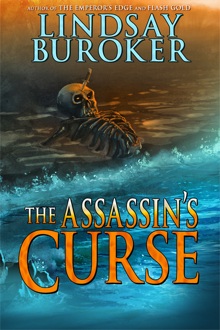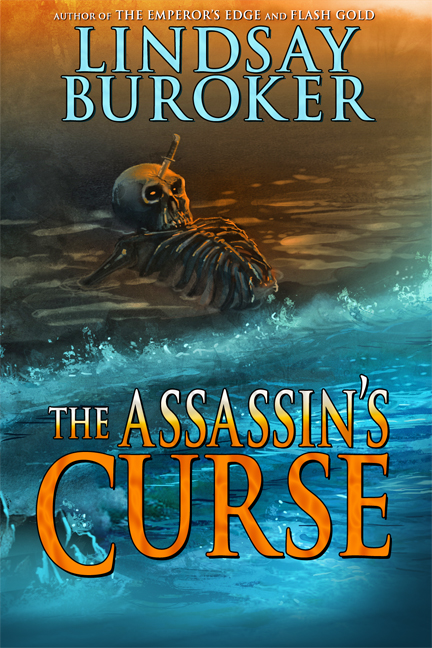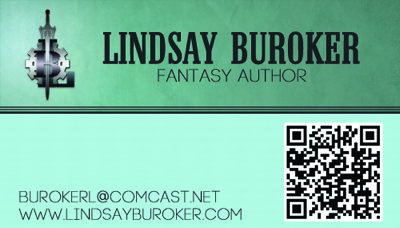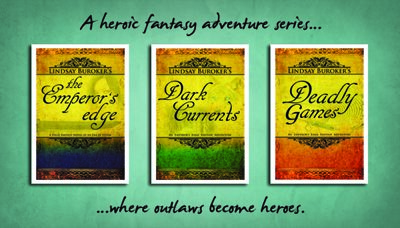 For those who are waiting for the fourth Emperor’s Edge book, it’s in the works, and I should be able to get it out this spring. In the meantime, here’s a 12,000-word adventure with Amaranthe and Sicarius. I wrote it over Halloween when I was waiting for edits to come back on Book 3, so it’s got a Halloween-ish vibe (you could probably tell from the skeleton on the cover!). 😉
For those who are waiting for the fourth Emperor’s Edge book, it’s in the works, and I should be able to get it out this spring. In the meantime, here’s a 12,000-word adventure with Amaranthe and Sicarius. I wrote it over Halloween when I was waiting for edits to come back on Book 3, so it’s got a Halloween-ish vibe (you could probably tell from the skeleton on the cover!). 😉
Blurb:
When outlaws Amaranthe and Sicarius chance upon spies stealing military prototypes, they immediately give chase. Well, immediately after Amaranthe talks Sicarius, former assassin and all-around non-altruistic type, into the mission. She wants an imperial pardon, and what better way to attract the emperor’s favor than by looking after the empire’s interests?
What seems like a straightforward mission develops a hitch when the spies flee to Darkcrest Isle, a forbidding chunk of land reputed to be haunted. Amaranthe isn’t quick to believe in tales of malevolent spirits, so she’s startled when the ever-pragmatic and unflappable Sicarius shows reluctance at setting foot on the island. Only when it may be too late to escape does Amaranthe come to understand why.
The story is 99 cents at Amazon, Barnes & Noble, and Smashwords.
Excerpt:
The afternoon sun beat onto ducks floating in the lake shallows and turtles basking on logs. Amaranthe Lokdon would have turned herself over to bounty hunters for a chance to float or bask. Instead, out in the middle of an inlet, she struggled to keep her head from going under as waves sloshed into her mouth and eyes.
Using both hands, she held a ten-pound brick in front of her face while her burning thighs rotated beneath the surface, kicking furiously to keep her afloat. Barely. Despite the cold lake water, sweat dribbled down her face. Her leaden arms ached and threatened to let the brick dip below the surface.
A few feet to her side, Sicarius, notorious assassin and fellow outlaw, held a heavier brick higher out of the water. No hint of strain flushed his cheeks, and a calm, expressionless facade masked his thoughts. He didn’t disturb the water with his kicks, and neither his face nor his short blond hair were damp. The summer heat might be enough to wilt normal men’s ambitions toward physical activity, but apparently this miniscule workout wasn’t enough to make him sweat.
Though Amaranthe appreciated his fitness and dedication to his training, there were times when she wished he were less perfect. More… human.
Feeling all too human herself, she groaned and ducked her head beneath the water to cool her face. The brief reprieve felt good, but she was careful not to let the brick dip below the surface. If she failed to keep it up there for long enough, he would make her to start over. For the third time.
Amaranthe was in charge of their group of mercenaries, but she bowed to him in manners of training. She wasn’t sure whose idea that had been, but she was beginning to regret it.
“How much… longer?” she asked when she came up.
“You grow weary?” Sicarius asked.
“Of course not.” Amaranthe tried not to pant or gasp as she spoke, or at least not to sound as if she were panting or gasping. “I’m just… concerned that… if we’re out here too long… we’ll get sunburnt. A bad burn… could inhibit our… ability to train tomorrow.” There, he wouldn’t see right through that. Of course not.
“It’s been three minutes.”
Dear ancestors, was that all? “Three minutes already? This isn’t… a very challenging exercise, is it?” A wave shoveled water down Amaranthe’s throat, and she sputtered, almost letting the brick drop before she recovered.
“Shall we switch weights?” Sicarius held his brick out toward her.
Why she always insisted on bravado with him, she didn’t know. Some deluded feeling that he would be more impressed with her that way, she supposed. “I wouldn’t want to deprive you of your training. It’s—”
A great crash boomed, drowning out Amaranthe’s words. At first, she thought it sounded like metal ramming against metal, but then a thunderous crack of wood echoed, like a tree snapping in two during an ice storm.
She lowered the brick and scanned the nearby shoreline. This far south of the city, rocks and trees dominated the coast with the land being too craggy for farming or building. Roads and the main railway to the capital did cut through the terrain, and she wondered if there might have been a train crash, or perhaps someone had run a steam lorry into a tree. Unfortunately, she couldn’t see rails or roads from the secluded inlet.
Amaranthe looked south, thinking a boat coming out the mouth of the river might have crashed into the rocks around Darkcrest Isle. The newspapers reported such incidents more often than one would think, and the island was supposedly haunted. Though she put little stock in such notions, the craggy landmass, gone wild with evergreens and brambles, did have a tendency to appear dark and brooding even on a sunny day.
Sicarius’s gaze was toward the mainland though, and he pointed at a hillock dotted with pine trees.
“Is that smoke?” Amaranthe asked.
“Yes.”
“A wreck? Shall we check it out?”
“It is unlikely that it involves us. Your brick.” He had not lowered his, of course.
Amaranthe hid a grimace. Her shoulders ached at the notion of holding that thing out of the water any longer. After all, they had swum two miles before this. Thanks to a couple of her men complaining about the difficulty of training due to the heat, she had been inspired to suggest water workouts. Her mistake.
“It could involve us,” Amaranthe said, smiling. “What if someone is in dire need of aid? Some warrior-caste patron or soldier on an errand for the Imperial Barracks? If we rushed to the assistance of someone like that, he could put in a good word for us with the emperor, a word that might help in our goals of exoneration. What do you think?”
“I think you seek to cut out the last half hour of your training.”
“I’m sure I don’t know what you’re talking about.” Amaranthe flipped onto her side and stroked toward the mainland with the brick on her hip. She was tempted to drop the thing, but he’d probably make her fetch it.
A boom roared through the hills, its power so great it sent ripples across the lake.
Amaranthe gaped. Where a gray wisp had floated into the blue sky before, great back plumes now wafted upward.
“That was more than a crash,” she said.
“Catastrophic boiler failure,” Sicarius said.
Despite his indifference, he was swimming after her. Good. If Amaranthe chanced upon a platoon of soldiers, they might be less interested in the fact that she had good intentions and more concerned about the fact that she was an outlaw with a death mark on her head. Sicarius’s head was even more wanted than hers—to the degree of a million ranmyas instead of ten thousand—but he could handle a platoon of soldiers, probably wearing nothing except his soggy trousers.
When they reached the shore, Sicarius put on his black boots and started strapping on his ample collection of daggers and throwing knives. The small armory never left him without the right tool for the job—a job that had been assassinating people until Amaranthe recruited him for her team. The dagger that rode on his right hip had a plain black handle and a matching blade made from some alloy she’d never seen anywhere else. He’d never told her the story of where he’d found it, but she’d seen him cut through rock, bone, and even metal with it.
Amaranthe stripped out of her smallclothes and tugged on dry trousers and a sleeveless shirt she had left folded on a rock. She didn’t worry about modesty. Sicarius had seen her nude before, and unfortunately he never seemed inclined to ogle her. She, on the other hand, had to make a point not to stare when he was walking about shirtless, with water snaking down his lean, muscled chest…
Amaranthe realized he had finished donning all of his gear and was waiting for her. Blushing, she stuffed her feet into her boots, tugged her wet brown hair back into a ponytail, belted on her short sword, and grabbed her repeating crossbow.
Sicarius took the lead, choosing a route that wound through trees instead of following the path. They passed the road, railway tracks, and the running trail that circled the lake without seeing anyone. Perhaps because sane people didn’t wander about in the late afternoon heat. Amaranthe was already sweating, and she was glad they didn’t tramp uphill for long before Sicarius raised a hand and dropped into a crouch behind a stout pine.
Amaranthe knelt by a stump a couple of feet away, crinkling her nose at the scent of scorched metal and burning wood. Flames, visible through the trees ahead of them, licked at branches and devoured brown needles carpeting the rocky terrain.
“We’d better not get too close,” Amaranthe said. “A forest fire is a possibility this time of year.”
Sicarius was gazing off to the left. Amaranthe leaned around her stump and caught her breath. The remains of a bipedal army steam tramper lay on its side, dwarfing the surrounding ferns and logs. The explosion had torn its boxy chest open, leaving metal peeled back like flower petals.
“That, on the other hand, shouldn’t be a possibility,” she muttered, referring both to the destruction and the location of the machine. Fort Urgot was ten miles north of their position, at the opposite end of the lake, where the soldiers had fields and special tracks for practicing maneuvers with their steam vehicles. They didn’t take them for strolls into the woods.
Sicarius lifted a finger to his lips, then signed, We are not alone, using the hand code one of their team members had taught them.
Soldiers? Amaranthe signed back and pointed to the wreck. She wondered if anyone could have survived that if they had been inside at the time of explosion.
Sicarius shook his head once. It could have meant no, or that he didn’t know. He was always hard to read. Before she could ask for clarification, he waved for her to stay put and disappeared into the foliage.
Amaranthe intended to be good and wait for him to return from scouting, but a breeze rattled the branches, and a beam of sunlight caused something to glint amongst the needles. She managed to ignore it for almost five seconds before easing out from behind the stump and creeping over to take a look.
A gleaming metal… thing lay on the ground, half-buried by dead leaves and needles. It was a weapon of some sort, but nothing she recognized. It had the length and breadth of a canon, but the barrel was divided on the inside. Two bronze wheels with spokes were smashed beneath it, one warped into uselessness. A metal lever—a crank?—dangled from the back of the barrel.
Something touched her shoulder, and Amaranthe jumped to her feet, spinning in the air. As she came down, her crossbow came up, finger finding the trigger.
Sicarius stood there, and he caught her weapon before her instincts aimed it anywhere that would have threatened him. It was a little disheartening how easily he did that, but as long as he was on her side, it didn’t matter. A blush warmed her cheeks though; she shouldn’t have been so entranced that it was easy to sneak up on her.
Find anything? Amaranthe signed the words in a rush, so he wouldn’t have time to point out her deficiencies.
He tilted his head toward the wreckage and strode in that direction.
“That’s what I like about you, Sicarius,” Amaranthe murmured. “You don’t over-explain things and ruin the mystery.”
He paused at the smoldering wreckage and pointed inside the toppled steam tramper body before moving aside so Amaranthe could look.
Though she had never ridden in one of the towering machines, she had seen them back in her days as an enforcer, when she could openly jog past Fort Urgot for her morning runs. There was a protected seat up top where a sniper could fire in three hundred and sixty degrees, while the inside held a cramped bench for two soldiers, a pilot and an artillery man, who worked a quad breach-loader with shells the size of cannon balls. The metal body rode on two articulating legs with duck-like feet that could maneuver across all sorts of terrain.
That was how it was supposed to look anyway. With holes blown through two walls due to the ruptured boiler, this one was such a mess that Amaranthe struggled to identify parts. The only thing she could tell for certain was that it had a lot of cargo, mostly weapons and none of them familiar. She pulled out a rifle, thinking it the most normal-looking find, but even it was more advanced than the percussion-cap firearms she had seen. She thumbed open a latch under the hammer to find an empty chamber.
“They’re prototypes.” Sicarius must have decided whoever had crashed the tramper had moved out of the area, for he spoke instead of signing. “The army has been working on cartridge ammunition.”
“Cartridge?” Amaranthe peered about the inside of the tramper, looking for… whatever a cartridge was.
“Bullets, powder, and primer in one shell. Come.”
Before she could digest the implications, he led her around the tramper. A man in black army fatigues lay prone, blood saturating the brown needles and dry dirt beneath him.
“He died in the explosion?” Amaranthe asked, thinking it must be the driver. Had he been stealing a bunch of priceless weapons, including the tramper, to sell to someone?
“No. His throat was cut.”
“Really?” She supposed it was wrong of her to find her interest piqued at the idea of murdered bodies, but if there was some grand scheme going on here, thwarting it could lead to the right kind of recognition for her and Sicarius.
“Two people walked that way.” Sicarius pointed south, toward the shoreline. “They were trying to hide their tracks.”
“But not skillfully enough to fool you, eh?” Amaranthe extended a hand, indicating he could lead. “Have I mentioned recently that I’m glad you’re on my side?”
“Compliments will not get you out of the last half hour of training,” Sicarius said and strode down the hill.
She groaned. “Why I’m glad you’re on my side, I’m not entirely sure.”
* * *
Grab the rest: Amazon | Barnes & Noble | Smashwords.








